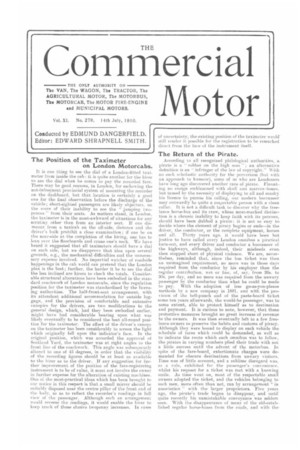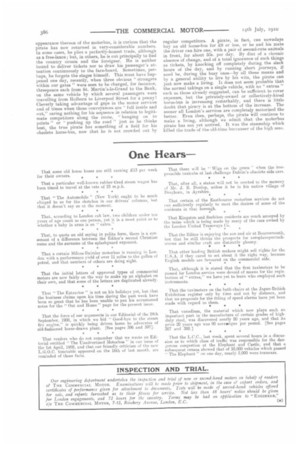The Position of the Taximeter on London Motorcabs.
Page 1

Page 2

If you've noticed an error in this article please click here to report it so we can fix it.
It is one thing to see the dial of a London-fitted taximeter from inside the cab: it is quite another for the hirer to see the dial when he comes to pay the recorded fare. There may be good reasons, in London, for eschewing the not-infrequent provincial system of mounting the recorder on the dashboard, but that location is certainly a good one for the final observation before the discharge of the vehicle; short-sighted passengers are likely objectors. on the score of their inability to see the " jumping twopences " from their seats. As matters stand, in London, the taximeter is in the most-awkward of situations for any scrutiny other than from an interior seat. If one dismount from a taxicab on the off-side, distance and the driver's bulk prohibit a close examination ; if one be on the near-side at the completion of the hiring, one has to lean over the floorboards and crane one's neck. We have heard it suggested that all taximeters should have a dial on each side, but we disapprove that idea upon several grounds, e.g., the mechanical difficulties and the unnecessaryexpense involved. No impartial watcher of roadside happenings in the cab world can pretend that, the London plan is the best; further, the harder it be to see the dial the less inclined are hirers to check the totals. Considerable structural alterations have been embodied in the standard coachwork of London motorcabs, since the regulation position for the taximeter was standardized by the licensing authorities. The half-front-seat arrangement, with its attendant, additional accommodation for outside luggage, and the provision of comfortable and extensive canopies for the drivers, are two modifications to the general design, which, had they been embodied earlier, might have had considerable bearing upon what was likely eventually to be considered the hest all-round position for the taximeter. The effect of the driver's canopy on the taximeter has been considerably to screen the light which originally fell upon the indicator's face. In the original position, which was accorded the approval of Scotland Yard, the taximeter was at right angles to the front lino of the coachwork. This angle was subsequently altered to one of 45 degrees, in order that. the visibility of the recording figures should be at least as available to the hirer as to the driver. If any suggestion for further improvement of the position of the fare-registering instrument is to be of value, it must not involve the owner in further expense for the alteration of existing machines. One of the most-practical ideas which has been brought to our notice in this respect is that a small mirror should be suitably disposed near the centre pillar of the front end of the body, so as to reflect the recorder's readings in full view of tho passenger. Although such an arrangement would reverse the readings, it would enable the hirer to keep track of those elusive twopenny increases. In cases
of uncertainty, the existing position of the taximeter would' still render it possible for the registration to be remarked direct from the face of the instrument itself.
The Return of the Pirate.
According to all recognized philological authorities, a.. pirate is a" robber on the high seas " ; an alternative definition is an infringer of the law of copyright." With no such scholastic authority for the perversion (but with an approach to humour), some of us who are Londoners have long ago discovered another race of pirate. Flaunting no ensign emblazoned with skull anu marrow-bones, but tamed by the necessity of displaying to all and sundry his licence to pursue his calling, our modern buccaneer• may outwardly be quite a respectable person with a clean collar. It is not a difficult task to discover why the freelance horse-bus and its crew, whose most-marked distinction is a chronic inability to keep faith with its patrons, should have been dubbed a pirate: it is not so easy todecide where the element of piracy begins or ends—in the driver, the conductor, or the complete equipment, horses and all. Thirty years ago, it would have been but justice to have called every London omnibus a piratical. turn-out, and every driver and conductor a buccaneer of the highways, although, indeed, their misdeeds even. then stopped short of physical violence. We are, nevertheless, reminded that, since the bus ticket was then. an unimagined requirement, no more was in those days required from the conductor by his employer than the regular contribution, wet or fine, of, say, from 26s. to 30s. per day, and no more was required from the unwary passenger by the conductor than what he could be madeto pay. With the adoption of less go-as-you-please methods by a new company in 1881, and with the provision of the bell-punch and of the paste-board ticket some ten years afterwards, the would-be passenger, was to some extent, able to protect himself as to destination and payment. It is curious to note, however, that these• protective measures brought no great increase of revenueto the owners. It was then eventually left to a few free. lance owners to preserve the habits and customs of piracy. Although they were bound to display on each vehicle the schedule of fares which could be demanded, as well as to indicate the route which each omnibus was to follow, the pirates in varying numbers plied their trade with not a little success until the advent of the motorbus. In spite of the fare-board, extortionate charges were demanded for obscure destinations from unwary visitors. time was of little account, and a sublime disregard was, as a rule, exhibited for the passenger's convenience. whilst his request for a ticket was met with a knowing smile. As time went on, most of the respectable small owners adopted the ticket, and the vehicles belonging to such men, more often than not, ran by arrangement " in association " with the larger proprietors, Five years ago, the pirate's trade began to disappear, and until" quite recently his unmistakable conveyance was seldom seen. With the disappearance of ninny of the old-estab-• fished regular horse-buses from the roads, and with the
appearance thereon of the motorbus, it is curious that the pirate has now returned in very-considerable numbers. In some cases, he plies a perfectly-honest trade, although as a free-lance; but, in others, he is out principally to find the country cousin and the foreigner. He is neither bound to deliver tickets nor to draw his passenger's attention continuously to the fare-board. Sometimes, perhaps, he forgets the stages himself. This must have happened one day, recently, when three obvious " strangers within our gates " were seen to be charged, for instance, threepence each from St. Martin's-le-Grand to the Bank, on the same vehicle by which several passengers \yens travelling from Holborn to Liverpool Street for a penny Cleverly taking advantage of gaps in the motor services and of times when those conveyances are "full inside and out," caring nothing for his sequence in relation to legitimate competitors along the route, "hanging on to points" or pushing up the road" just as he thinks best, the true pirate has something of a field for his obsolete horse-bus, now that he is not crowded out by
regular competitors. A pirate, in fact, can nowadays buy an old horse-bus for S.:8 or less, or he and his mate the driver can hire one, with a pair of second-rate animals in front, for about 35s. per day. By dint of a chronic absence of change, and of a total ignorance of such things as tickets, by knocking off completely during the slack hours of the day, and by running short journeys, if need be, during the busy ones—by all these means and by a general ability to live by his wits, the pirate can just now make a living. It does not seem probable that the normal takings on a single vehicle, with no " extras" stiell as those already suggested, can be sufficient to cover expenses, but the privately-owned or collectively-hired horse-bus is increasing remarkably, and there is little doubt that piracy is at the bottom of the increase. The sooner all London's services are completely motorized the better. Even then, perhaps, the pirate will continue to make a living, although we admit that the motorbus pirate has not yet arrived. It was the steamship which killed the trade of the old-time buccaneer of the high seas.




















